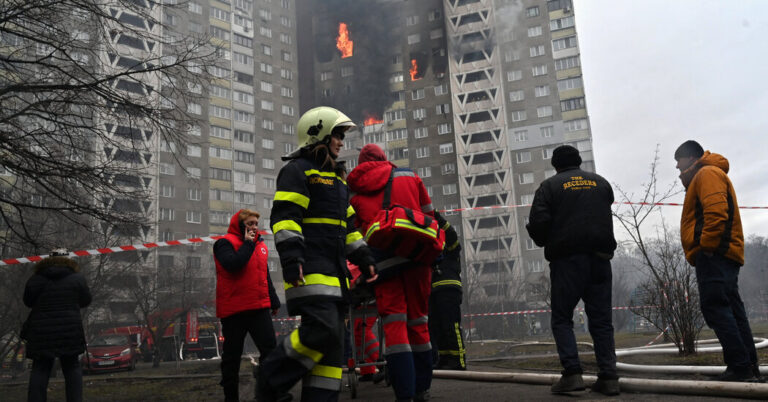Missiles streaked into Kyiv early Wednesday in a Russian attack that killed at least five people, according to local officials, jolted residents awake with air alarms and explosions, and ignited a fire that sent plumes of smoke billowing over the Ukrainian capital.
The barrage, which directed missiles and drones at cities across the country, coincided with a moment of heightened uncertainty for Ukraine. Russian forces are pressing assaults in towns and villages along the front, American aid is in doubt, and President Volodymyr Zelensky of Ukraine is preparing for what he has hinted will be a major shake-up in his government and the army’s leadership.
Mr. Zelensky is considering replacing Gen. Valery Zaluzhny, the country’s top military commander, but has not announced any decision on the matter. General Zaluzhny remains in his job and said on Wednesday morning that Ukrainian air defense teams had destroyed 44 of the 64 cruise missiles, ballistic missiles and drones that Russia had fired in the assault.
Since the end of last year, Russia has stepped up its large-scale aerial bombardments in a bid to exploit dwindling supplies of critical Western air defense munitions and inflict maximum damage.
“Ukraine needs help,” Andriy Yermak, the head of the Ukrainian president’s office, said in a statement. “Only the joint efforts of the democracies will stop the criminal Putin.”
A broad measure that would allow American arms to flow to Ukraine once again is expected to fail in a Senate vote on Wednesday amid growing Republican opposition and deep division on Capitol Hill.
Since Russia’s full-scale invasion in early 2022, the United States has provided about half of the foreign military assistance to Ukraine’s arsenal. European nations lack American-level stockpiles of weapons and ammunition, and would be unlikely to fill the gap, military analysts say.
The dwindling level of aid is affecting Ukraine on the battlefield. Its soldiers are struggling to stem relentless Russian assaults in eastern Ukraine, and the attacks by Russia, which has an advantage in artillery and personnel, are whittling away at Ukraine’s defenses.
“Ukraine could effectively hold for some part of this year” without more American military aid, Michael Kofman, a Russia expert at the Carnegie Endowment for International Peace in Washington, said in a telephone interview. “But over time there would be no prospect to rebuild the military, and they will start to lose slowly.”
The absence of further American help, he said, would “point to a dour, negative trajectory in the latter half of this year.”
Western support for Kyiv has not kept pace with Moscow’s military stockpiles as Russia has scaled up its production of drones and is bolstered by supplies from Iran and North Korea. So Ukraine is once again seeking ways to adapt and improvise.
To that end, Mr. Zelensky announced a new military branch this week: the Unmanned Systems Forces. The Ukrainian military, he said in his Tuesday evening address to the nation, is creating “special staff positions for drone operations, special units, effective training, systematization of experience, constant scaling of production, and the involvement of the best ideas and top specialists in this field.”
“This is not a matter of the future, but something that should yield a very concrete result shortly,” he added.
Mr. Zelensky said that the goal was to replicate on land Ukraine’s success in combating a vastly superior Russian naval force on the Black Sea through the use of maritime drones. At the moment, however, Russia’s superior firepower has Ukraine on the back foot along most of the front line.
After months of Russian assaults aimed at capturing the eastern Ukrainian city of Avdiivka, Moscow’s forces have fought their way into the city’s northern edge, soldiers fighting there said in interviews. That has threatened a vital supply line and compromised Ukraine’s defenses.
Military analysts said that with conflicting reports about where fighting was taking place, it was difficult to assess the situation. “As for the potential of the Russians to advance, the question is open,” Ivan Kyrychevskyi, a military analyst for the Kyiv-based Defense Express Media and Consulting Company, said on Ukrainian national television.
“At the moment, we can state that the fighting has begun in the suburban area of Avdiivka, but it is too early to draw conclusions,” he added.
If the Russians have managed to entrench themselves in the city after months of fighting in the surrounding areas, the battle could shift to even more brutal urban combat.
On Wednesday morning, the scope of Russia’s latest attacks on Ukrainian cities was still coming into focus, but four people were killed in the capital and at least 32 others were injured, according to city officials.
As the Ukrainian Air Force warned that missiles were streaming toward Kyiv along the Dnipro River around 7 a.m., interceptor missiles streaked through the skies to meet the threat. Explosions echoed in the skies, and a residential building caught fire in the attack, sending plumes of black smoke over the city of more than three million during the morning rush hour.
Residents in one neighborhood temporarily lost power after debris hit a high-voltage cable, the local power provider, DTEK, said in a statement.
In the southern port city of Mykolaiv, airstrikes damaged more than 20 residential buildings, city officials said, and killed at least one person.
Missile attacks were also reported in the Kharkiv region of northeastern Ukraine, in Cherkasy in the center of the country, and in the Lviv region near the border with Poland.

